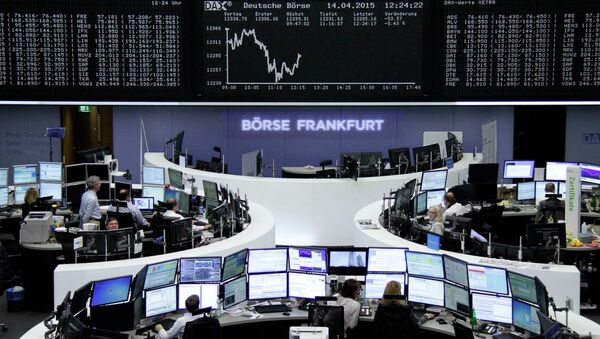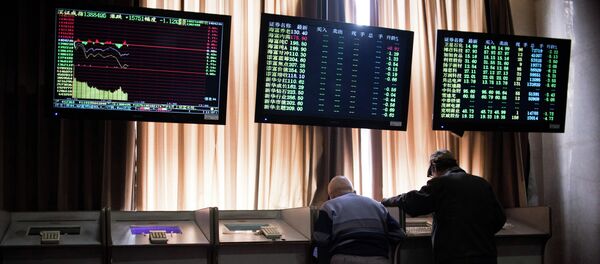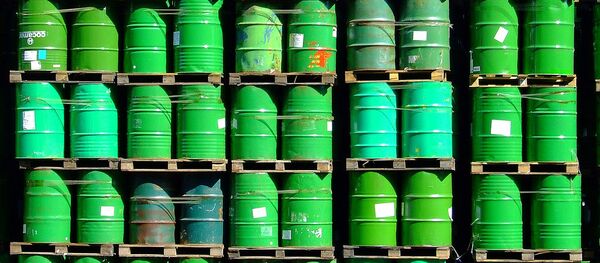Most markets in Asia-Pacific rallied on Thursday as well, encouraged, along with the US news, by the growing demand for raw materials, suggesting global growth picking up.
Among the weaker spots on Thursday were mainland China, suffering a record capital flight from January through to March, and the Eurozone, where record low bond yields and losses in the region’s major alcohol producer rendered investors seeking more profitable opportunities elsewhere.
Wall Street Trading Chopped with Earnings Season Full-On
Late Wednesday’s trading in New York turned into a surprise rally for stocks across most sectors after a series of solid profit reports in America’s largest enterprises. Oil advanced as well, as US oil stockpiles added less than expected last week, according to the governmental data. The overall greater demand for energy and materials is also supportive for US economic growth and inflation, prompting traders to think the Fed might really hike its base interest in June.
The Dow Jones Index rose 0.42%, the S&P 500 added 0.51%, the Nasdaq Composite rose 0.68%. US crude stockpiles added only some 1.3 mln bbl to 483.69 mln bbl, the smallest since early January, effectively pushing oil prices up.
However, overnight US stock futures retreated ahead of the potentially soft earnings reports by Citigroup and Goldman Sachs. E-mini futures on the S&P 500 lost 0.2% as investors are cautious ahead of Thursday's trading. Tumbling profits in the aforementioned financials will effectively send major indices down early Thursday, while more solid earnings will trigger a rally. Futures on S&P rose 0.5% during Wednesdays’ rally, so there are still gains. Future contracts on the Dow shed 0.1% as anxiety mounts.
Among less prominent firms, game developer Mattel Inc and the tobacco company Philip Morris also reported Thursday, naturally impacting stocks valuations to a lesser extent. Meanwhile, United Health Group added 4% its stock valuation after raising its 2015 profits outlook. Netflix, the media streamer, jumped 12% after having reported a great increase in subscriptions in Q1.
Investors are also awaitingdata on housing development starts in March month-on-month, and the weekly jobless claims report, both arriving early Thursday. The trend is modestly optimistic, but markets participants are all jumpy.
Asian Stocks Up With Commodities, China’s Capital Flight
Thursday trading in Asia-Pacific was dominated by a bullish sentiment, driven by the rise in oil prices. The regional stock index rose to its 7-year peak, in line with most emerging stocks. Nonetheless, mainland China, suffering a bad capital flight, rose one-third in Q1, while the inbound investment only rose about 11% annualized.
The MSCI Asia-Pacific Index rose 1.1% in Hong Kong amidst a sudden bullish sentiment. Many stocks had been heavily undervalued due to a capital flight, but the rallying raw materials turned thing optimistic. Hong Kong’s Hang Seng Index rose 0.4%, becoming one of the world’s best performers in April thus far. Even mainland’s Shanghai Composite added 2.7% despite the loss of foreign investment money, partially replaced by domestic funds. The index rose some 99% annualized, settling at its pre-crisis 7-year high.
In Hong Kong, stocks are currently undervalued, and the market is in a relative isolation, as most investors are keeping their eye of either the mainland or Japan. Now, the FDI build-up in the mainland rose by only some 2.2% in March, the quarterly figure being 11.3%, with the capital outflow rising 29.6%.
Mainland China’s exports fell an annualized 15% this past March, the worst performance since 2009. Services are on the rise in China, as Beijing is attempting to remodel its economy to a more domestically-driven model, while the export-oriented manufacturing model is contracting. Q1 FDI in services surged 24.1% annualized to $21.59 bln, while industrial investment shrunk by 3.6% to $11.22 bln.
In Japan, the Nikkei 225 rose 0.1% up, despite the initial tendency which was downward. At the open, investors were cashing out their stock, especially in the food equities, nervous ahead of earnings season there. Nevertheless, a frantic buyout in energy-related stock completely offset the initial losses. The broader Topix Index added 0.7%. The best performer was the Inpex Coro, adding 5.4%, and the Japan Petroleum Exploration, rising 3.8%, both in the energy sector.
In Korea, the Kospi Index finally topped the three-year ceiling of 2,100 points due to a broadband influx of foreign investment. International investors bought some $4.3 bln Korean equities this year due to their relative cheapness and better corporate profits. Korea’s manufacturers have really posted stronger earnings due to a stronger dollar, the local central bank’s stimulus and the consequent rise in international competitiveness.
The Kospi might soon overcome even the 2,200 mark, should the current trends continue.
Europe Retreated From 14-Year Highs on Alcohol, Media
European shares slipped slightly in Thursday trading, retreating from their 14-year highs.
The liquor-maker Diageo reported a 0.7% fall in sales in Q3 (ending on 31 March in Europe), resulting in its stock decline of 2.6%. Consequently, the pan-European FTSEurofirst 300 Index slid 0.3%, extending losses to 0.6% later as the media stocks retreated.
The educator Pearson PLC led the media decline, following a collapse in one of its recent tech projects, having lost 3.6%. The Los Angeles schooling authority filed a $1.3 bln refund claim against Apple, having used Pearson timetables in their iPad plan.
The STOXX Europe Media shed 1.3%. In London, the FTSE 100 Index lost 0.3%, the Frankfurt, the DAX Index retreated 1.2%.
Against the odds, Unilever was 3% up, having reported better-than-anticipated quarterly sales. The brewer SABMiller added 2%, also reporting a slight increase in yearly sales.
Commodities
Brent crude rose over 3% on Thursday, posting a 2015 high at $63/bbl as US demand increased, while local drillers halted some 50% their scale of operation (with little regard to output volumes though).
The immense oil production in the US is slowing, and even though Saudi Arabia increased their output by half of Bakken's production in March, stronger demand is pushing prices up. The market is balancing itself now, as higher prices will push US drillers to increase output again. The market remains oversupplied though.
Brent crude futures for June delivery reached $63.29/bbl, highest since December, while US crude was at $56/bbl.
In metals, copper rose 1% to $6,012 per metric ton on preliminary allegations the US housing market expanded in March. The US housing data for March arrive Thursday, but there are expectations new home starts rose 15.9% against the 17% decline in February. No wonder raw materials are rallying, with other 6 industrial metal advancing on bourses.




